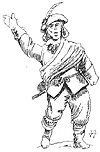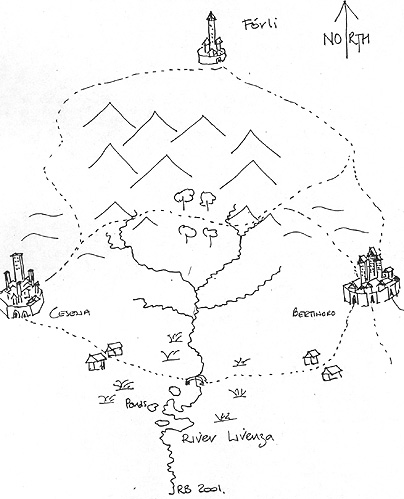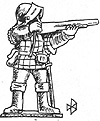 [From the Solo Wargamers Association Renaissance Tournament run by Chris Grice. Original handwritten manuscript discovered in a chest in the attic…]
[From the Solo Wargamers Association Renaissance Tournament run by Chris Grice. Original handwritten manuscript discovered in a chest in the attic…]
Albengó stood on the gun platform, two days before it had been a wooded hill with cultivated fields about. Now the timber had become breastworks behind which Albengó’s culverins were deployed.
The cultivated fields were occupied by his army who had quickly picked the edible crops. The enemy caught by the speed of his approach had had no time to destroy the food supplies in the villages and fields around the city.
But such surprise meant Albengó was ill equipped for a prolonged siege, while across the small valley the city walls of Cesena felt the last rays of the sun. Tomorrow Albengó’s culverins would attempt a breach and God willing the city would be his for the taking.
But that would be tomorrow. Albengó da Bariano reflected on his recent good fortune this far and it had all started in the spring.
Albengó was preoccupied with his contract. Michelletto Attenddo, chief financier of Bertinoro had again frustrated attempts to conclude a deal and even Luc d’Attendolo, Bariano’s main ally had been unusually neutral in the dealings. It was fortunate then that Niccoló da Tolentinó, a very rich merchant, at that moment dealt Albengó an ace (literally!). Niccoló had exclusive interests in both Forli and Cesena, unfortunately his very underhanded dealings in Cesena had resulted in the usual necessary murder or two. Except that one of the murder victims was a close relative of a senior noble of Cesena, one Tiberto Brandolini. It was easy to stoke the already strained relations between the two cities and Tiberto used his allies in Forli to goad the Cesenese to war.
 Mobilising their not insignificant forces, the men of Cesena attacked Bertinoro. Even as they marched, argument raged in Bertinoro about retaining the expensive Albengó. Then, the arrival of a muddy rider at the Palace of the Attendolos abruptly changed the situation. Albengó was summoned and ordered to mobilise his troops. Already well briefed, he sought to confirm that his commissions would be in accordance with his latest request concerning his contract. Reluctantly Michelletto Attenddo agreed at the insistence of Niccoló da Tolentinó and Luc d’Attendolo amongst others.
Mobilising their not insignificant forces, the men of Cesena attacked Bertinoro. Even as they marched, argument raged in Bertinoro about retaining the expensive Albengó. Then, the arrival of a muddy rider at the Palace of the Attendolos abruptly changed the situation. Albengó was summoned and ordered to mobilise his troops. Already well briefed, he sought to confirm that his commissions would be in accordance with his latest request concerning his contract. Reluctantly Michelletto Attenddo agreed at the insistence of Niccoló da Tolentinó and Luc d’Attendolo amongst others.
Luc d’Attendolo soughted out Albengó and demanded that war against Cesena was actually fought on Cesena soil – Albengó said he would be lucky to avoid a battle in the very streets of Bertinoro. Luca was worried about his extensive property east of the city around the River Livenza.
Meanwhile Michelletto Attenddo gave Donato del Caule, Collaterale to the Bertinoro War Council, clear instructions to log every breach of rules by Albengó.
Albengó was quite happy. Donato would be more than matched by the War Council’s Provveditore, Giorgio Comer who had the ear of the merchant Niccoló da Tolentinó and having been ‘looked after’ was Albengó’s ally. And what of Albengó da Bariano? Albengó was a very experienced military contractor and commander, whose loyalty to his men and protection of them against unnecessary battles was the envy of his condotte peers. But now Albengó was getting older, too old for him to remain the wandering contractor and he now wanted a settled life, which Bertinoro would give him. This latest contract just agreed, provided for land as well as money to settle his three years of back pay!
Albengó da Bariano considered his two captains; Andrea d’addo Fortebracco (Braccio) had already lost one eye and had a pronounced limp. However, his youthful exuberance made his codetta extremely loyal, but it had caused him to be exiled from his home city of Forli. Ultimately, he hoped to build a great condotte and exact revenge on his enemies in Forli.
Averardo Garzaga, on the other hand, was one of Albengó’s most trusted and long serving captains , not that that prevented a ruthless and hot-headed streak to appear now and again. Averardo also had command of the stradiots, whose skills were indispensable, but some of their methods were intolerable.
Albengó had given them orders to scout along the high road to Cesena to discover if the enemy was abroad and preferably destroy them. But if outnumbered, they were to retreat slowly using the land to defend their positions.
Later that morning Albengó ordered the main army eastwards to Livenza, as the enemy had been reported near the river. Albengó had taken care to let it be known that looting and pilfering of Luc d’Attendolo’s land and any others would be met with the most ruthless discipline.
The Condotte of Bertinoro
Albengó’s Condotte
500 Men-at-Arms
640 Pikemen
360 Shot
200 Sword & Bucklermen
2000 Crossbows
Fortebracco’s Condotte
500 Men-at-Arms
1000 Crossbows
Garzaga’s Condotte
1000 Stradiots
 Like all good captains the paper numbers above were rarely to be seen in the field, not that it stopped payment being claimed! The winter just gone had been a difficult one for Albengó, as many men had slipped away in the belief that he would not get a new contract.
Like all good captains the paper numbers above were rarely to be seen in the field, not that it stopped payment being claimed! The winter just gone had been a difficult one for Albengó, as many men had slipped away in the belief that he would not get a new contract.
Meanwhile, Donato del Caule was being well looked after by Albengó.
Fortebracco had at his disposal:
500 Men-at-Arms
500 Stradiots
1000 Arquebus Infantry
2000 Crossbows
An Artillery Train of light field cannon – mainly falconets
Albengó deployed on the low road at Livenza:
500 Men-at-Arms
500 Stradiots
1000 Arquebus Infantry
1000 Crossbows
1280 Pike & 720 Shot
400 Sword & Bucklermen
1000 Militia
An impressive Train of Artillery comprising culverins, sakers and falconets.
Back to Table of Contents -- Lone Warrior # 147
Back to Lone Warrior List of Issues
Back to MagWeb Magazine List
© Copyright 2004 by Solo Wargamers Association.
This article appears in MagWeb.com (Magazine Web) on the Internet World Wide Web.
Other articles from military history and related magazines are available at http://www.magweb.com
